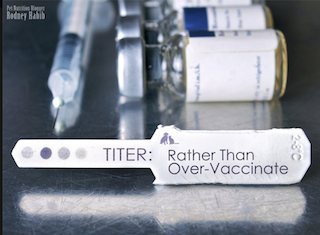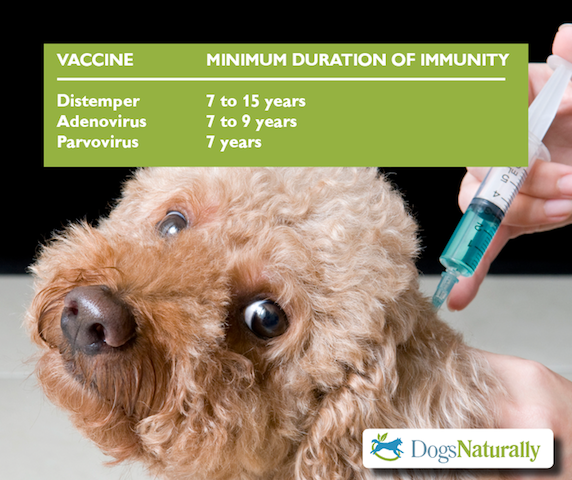
RETURN TO HOME PAGE
Click to meet our Chin.... !! Available Puppies !!
*Click Raising your Chin Puppy....
Adoption Information
TITRE TESTING
From Dog's Naturally Magazine

Enlightened
veterinarians and pet parents have become increasingly wary of the health
risks, and lack of benefits, associated with repeatedly vaccinating dogs after their initial "puppy shots."
Is titre testing the solution to the over-vaccination problem?
Here is a crash course
to help you muddle through the mire of misinformation surrounding this simple
blood test, and to help you decide whether or not to test your dog's antibody tigers.
What is Titer Testing?
A titre test (pronounced TIGHT ER) is a laboratory test
measuring the existence and level of antibodies to disease in blood.
Antibodies are produced when an antigen (like a virus or bacteria) provokes a response from the immune system.
This response can come from natural exposure or from vaccination.
(Note: tittering is also called serum vaccine antibody
tittering and serologic vaccine tittering.)
How is the Test Performed?
Your test result will have an explanation of what your pet's test result means.
But if you want to know more, here is the test in a nutshell:
First, one mL of blood is drawn.
The sample is then diluted.
Titre levels, expressed as ratios, indicate how many times blood can be diluted before no antibodies are detected.
If blood can be diluted a 1000 times and still show antibodies, the ratio would be 1:1000.
This is a "strong" titre. A tiger of 1:2 would be weak.
Should I Test for All Diseases?
The most recommended test examines antibodies for both parvovirus and distemper
the two most important viruses. Rabies titres are also often tested.
Usually, for most dogs, tests for other diseases are generally not considered useful or necessary.
Why Titer Test?
The parvovirus/distemper test can help you or others (vets, groomers, kennel owners, etc.)
determine if your dog requires additional vaccination, and may save your dog unnecessary shots.
It is especially useful when making a decision about vaccinating an animal with unknown vaccination history
or for determining if puppies have received immunity from vaccination.
Most experts believe strong titres are a more reliable indication of immunity than vaccination:
tests show the actual immune response, not just the attempt to cause an immune response by vaccination.
Do not expect, however, that everyone will accept test results in place of proof of vaccination.
The subject of immunity is complicated, and we are programmed to think of vaccination
as "the gold standard" = the more, the better. Experts who challenge the status quo are often maligned.
Humans don't like change.
How often should I Test Titers for Parvo and Distemper?
You are going to have to decide for yourself. Some vets recommend testing yearly
but this can be expensive. Others test every three years.
Still others test five to seven years after vaccination.

Why?
Challenge tests show that successful vaccination against parvovirus gives most animals at least seven years of immunity.
Distemper provides immunity for at least five to seven years.
Dr. Ron Schultz, one of the most renowned pet vaccination experts in the country
believes that once a test yields strong titres, you need not test again.
In Dr. Jean Dodd's article on vaccine reactions, she quotes Dr. Schultz on the value of testing titres:
"an animal with a positive test has sterilizing immunity and should be protected from infection.
If that animal were vaccinated it would not respond with a significant increase in antibody titre
but may develop a hypersensitivity to vaccine components (e.g. fetal bovine serum)."
Does a Weak Titer Mean My Dog Deeds a "Booster" Shot?
Maybe not for dogs that have previously shown strong titres.
Many experts, including Dr. Schultz, say the dog's immune system will have produced
"memory cells" that will produce antibodies when they're needed.
Think of memory cells as reserve forces.
When known foreigners invade, they remember how to attack them.
Dr. Shultz has said, show that an animal with a positive test has sterilizing immunity and should be protected from infection.
If that animal were vaccinated it would not respond with a significant increase in antibody titre,
but may develop a hypersensitivity to vaccine components (e.g. fetal bovine serum).
Read more about memory cells here. Read pages 5-6 of Antibody Titers vs Annual Vaccination by Richard Ford, DVM for more information.
Should I Test My Puppy?
Yes! If so, when? Ideally, puppies should have had their last vaccination after 16 weeks of age
then should be tested to see if further vaccination is necessary.
Bijou Standard Poodles recommends following Jean Dodd's vaccination protocol.
vaccination a year after the last vaccination and then titre at 3-4 years.
There is an excellent discussion about testing puppies in the 2011 American Animal Hospital Association (AAHA)
Canine Vaccine Task Force Report (page 13) entitled "What Are The Possible Applications of Serologic Testing?"
It reads, "Such titre testing is the only way to ensure that a puppy has developed an immune response after vaccinating."
What do Titer Tests Cost?
Testing costs vary widely from practice to practice, so shop around.
Some vets do in-house testing. Others use outside labs.
Some mark up tests and services a little; others, a lot.
You should be able to have parvo/distemper tests done most places for less than $100.
Rabies tests, on the other hand, can cost considerably more, in large part because they are sent overnight to a lab.
(Ask your vet to have a Titer Testing Day so that they can send multiple tests in one package and save considerably on shipping costs.)
Consider contacting Hemet, Dr. Jean Dodd's nonprofit organization, for their pricing and her excellent reading of results.
When comparative shopping, make sure pricing includes blood draw and shipping.
Wait!
Before jumping to the conclusion that vaccinating is much cheaper than testing
remember that testing can be a one-time (or at least rare) expense and is no riskier than any simple blood draw.
Vaccinating, on the other hand, can potentially cause a lifetime of illness.
Should I Titer Test for Rabies?
The rabies titre test will give you an indication of your dog's immunity if he or she is at particular risk for contracting rabies.
It may also be required prior to international travel.
Test results will NOT be accepted by Animal Control and most others as a substitute for vaccination of healthy dogs as required by law.
If your dog has documented health problems or documented adverse reactions to shots,
your vet may be able to get your dog an exemption to rabies vaccination.
(Learn more at www.Truth4Dogs.org.) A rabies titre test is not usually necessary when requesting an exemption
but may be useful when re-applying for a denied exemption.
It may also give you and others piece of mind if you are contemplating an exemption.
(Note: a French challenge study has shown rabies vaccination gives immunity for at least five years.
In the U.S, the Rabies Challenge Fund is doing concurrent tests for five years and seven years to extend the period between shots.
This important nonprofit study is funded solely by donations from dog lovers like you.)
Can I Titer Test Immediately After Vaccination?
To get an accurate test, you must wait at least 14 days after vaccination before testing.
What if your vet, groomer, spouse, best friend, kennel owner or day care proprietor
says titre testing is "voodoo science," that your dog needs continued vaccination even if testing indicates otherwise?
Know that vets out of school longer than 10 years received little or no immunology
or vaccinology training in school they shouldn’t be considered experts unless they’ve devoted hundreds of hours
to research and training. Others who want to influence you may have no training at all and may be acting out of fear.
Do your own research and advocate for your dog.
TITRE MEASUREMENT
by Ron Hines DVM PhD
For Parvovirus of dogs and canine distemper, anything = 1:50 - 80 titre is generally considered protective,
canine adenovirus-1, = 1:50, considered Protective
rabies = 1:5 is thought to be protective
Leptospirosis titres of =1:400 are associated with current infection
(others use = 1:800 as the cut off) yet some infected dogs never exceed 1:100
(what is more suggestive of a current leptospirosis infection is a rising titre).
Titre Tests
Most Titre Tests just offer a positive for antibody or negative for antibody result
Positive meaning = Protected as there are antibodies present
Negative meaning =Unprotected as there are very little antibodies present
Now I could get deeper into how antibodies are obtained, but I'm keeping this simple.
Suffice to know that Labs error on the side of caution with their results and there has been cases of false negatives
which prompted me to search for tests and or labs that actually offer values instead of just positive or negative
and only 3 turned up: Cornell and Dr. Jean Dodds and Kansas State University
Please call them to confirm, if this is something you wish to have
Cornell University (I'm told will give you the number of antibody call to confirm) :
Canine Parvovirus (CPV-2) HI - CPVHI = $16.50
Canine Vaccine Panel 1 - CVP1 (Includes Distemper SN and Parvo HAI) = $33.00
Canine Vaccine Panel 3 - CVP3 (Includes Distemper SN, Parvo HAI, Coronavirus SN) = $49.50
Rabies = $20.00-$80.00
Kansas State University:
FAVN-Rabies Antibody for Export = $90.00
Hemline Diagnostics
Distemper & Parvovirus Titers = $ 52.00
Rabies Titer = $98.00
Rabies FAVN Testing = $120.00
RETURN TO BIJOU HOME PAGE


